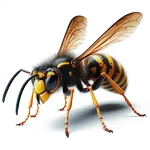Hampshire Wasp Control - Wasp Nest Removal Specialists
Have you got Wasps? Why not give us a buzz and get rid of your problem today!
We can eradicate your wasp or hornet nest fast!
Thank you for visiting our website.
As winter sets in, the activity of wasps and hornets decreases, giving relief to homeowners. During this season, the chances of encountering a live nest are low. Unlike the summer months when wasps are more active and can pose a challenge, the colder months bring a quieter period for these insects.
It is important to note that any nests found in winter will be lifeless and won't be reused. This knowledge provides an extra layer of assurance, making the winter season a peaceful time without the threat of live wasp nests. Please explore our resources to stay informed and take a proactive approach to address future wasp concerns.
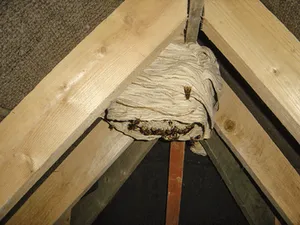
If you are dealing with honey bees swarming or have a bee colony, we can help you. Check out our information page on honey bee swarm collection for assistance.
We have designed informative pages to help you identify and understand wasps, hornets, and bees. Here's what you will find on our website:
To find the proper assistance, you can refer to our Hampshire Wasp Control area map or use our postcode search for accurate results.
Whether you are dealing with a small wasp nest in your garden or a large hornet nest in your loft, we can handle it. We have never encountered a wasp or hornet nest that we couldn't treat.
At Hampshire Wasp Control, we are committed to addressing your nest issue promptly and safely. We aim to treat your nest on the same day or the next day at the latest. Your satisfaction and safety are our top priorities.
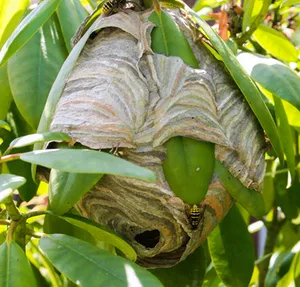
Before you call us, we recommend watching these short video clips that can help you identify your wasp-related issue.
The first video showcases wasps in different nesting scenarios. Take a moment to watch it and compare your situation with what's shown in the clips.
The first video is predominantly wasps, showing different nesting scenarios.
The second video presents a variety of clips, encompassing honey and bumble bees.
While observing the bee clips, kindly compare them to your wasp-related issue. Observe the insects' behaviors and actions carefully to make an accurate comparison. However, please note that we are not responsible for handling any bee-related problems. We would appreciate your cooperation in this matter.
Honey Bee Swarms North Hampshire
If you live in North Hampshire and you think you might be dealing with a honey bee swarm (you can confirm it by visiting our wasp nest identification page). Fortunately, the Andover Beekeepers Association offers a free bee swarm collection service! You can find their contact details and additional information on their website.
If you're not in North Hampshire, don't worry! A quick search for your local beekeeping association should lead you to the assistance you need, or you can look for a local beeswarm collector.
Our website offers a comprehensive sitemap that enables you to navigate seamlessly through all our pages and find the information you need with ease.
In case you are in a different region of the UK and require assistance with wasp-related concerns, we invite you to explore our sister site - Wasp Nest Removal Services UK. It provides specialized and practical resources and services tailored to your location.
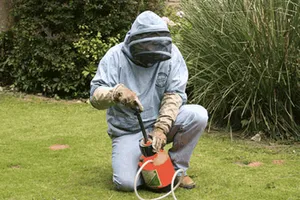
Key areas we service
The key areas where we control wasps in North Hampshire/Surrey are:
The key areas where we control wasps in South West Hampshire are:
If you are unsure if we cover your area, please do not hesitate to call us. We will be happy to help.
Latest blog posts
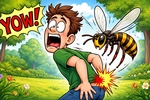
Most wasp stings cause temporary pain and swelling, but know the first aid steps and signs of severe reactions like anaphylaxis for safe handling in the UK.

Stay informed about our team changes and our commitment to transparency and exceptional service. Your trust and satisfaction are our top priorities.

Discover how climate change impacts wasp populations and behavior. Learn proactive steps to mitigate risks and protect your outdoor experiences.

Treating wasp nests near a garden pond or river requires special care to prevent harm to aquatic life. Learn safe and effective methods here.

Learn why removing old wasp nests is unnecessary. Discover their seasonal habits, benefits of leaving nests, and their role in pest control.
Let's explore the behavior of wasps during the winter season, which typically lasts from November to March.
During these colder months, the wasp population experiences a period of rest. The queen wasps, who are critical for the survival of their colonies, hibernate during this time until the spring season arrives. The worker wasps and drones would have died off in the previous autumn.
Sometimes, if the winter weather is milder, some queen wasps may wake up from their hibernation and venture indoors, which could be a temporary problem. However, it's important to note that these awakened wasps are unlikely to survive without a source of food.
It's not uncommon to come across wasp nests during winter, but most of them are lifeless unless they are abnormally large. These nests have reached the end of their lifecycle and are inactive. They will never be reused, which means they pose no threat unless they obstruct something. Therefore, these dormant and permanently inactive nests don't require any action. Winter is a time when wasp colonies and their nests fade away, making room for the renewal of nature in spring.
